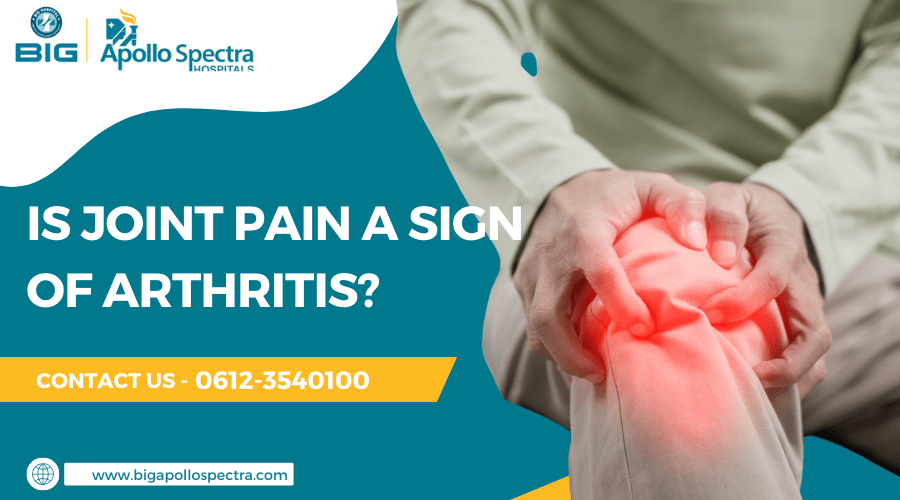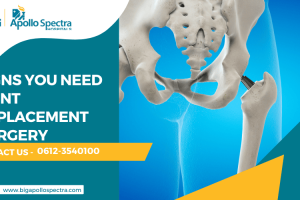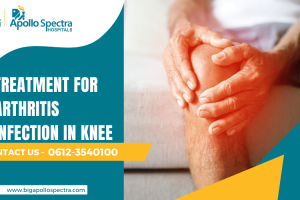Constant Joint Pain and Weakness affecting your life? That relentless discomfort — it might be more than just a passing nuisance. It could very well hint at arthritis, you see!
Is Joint Pain A Sign of Arthritis? This is a condition that tends to affect many millions around the globe and we’re talking about specific disorders inducing inflammation in joints.
So, What Is the Main Cause of Arthritis? The common symptoms include pain, swelling, even limited mobility of sorts!
If this sounds familiar don’t sit back. Seek out professional medical advice; get yourself accurately diagnosed for effective Joint Pain Treatment.
And if you happen to reside or look for Bone Hospital Near Me? Look no further make your first stop at Big Apollo Spectra! Best Orthopedic Hospital in Patna and they’ve earned their name through unwavering commitment towards exceptional healthcare services.
Big Apollo Spectra is a great option if you’re looking for dependable and complete orthopedic solutions. They’ve got a team of Bone Specialist Near Me who specialize in the field, coupled with pioneering technology teamed up with an approach entirely focused on the patient’s needs.
Suffering from joint pain? Is Joint Pain A Sign of Arthritis? It can seriously derail your daily routine— so why not put some faith in Big Apollo Spectra? Their care is personalized and handled by experts.
Common Causes of Joint Pain
Joint pain can be caused by a variety of factors, and it is often a symptom of an underlying condition. Here are some common causes of joint pain:
#1. Arthritis:
This is a broad term that refers to inflammation of the joints.
There are several types of arthritis, including osteoarthritis (wear and tear of the joints), rheumatoid arthritis (an autoimmune disorder), and gout (a type of arthritis caused by the buildup of uric acid crystals in the joints).
#2. Injuries:
Joint pain can result from injuries such as sprains, strains, or fractures. Trauma to the joint can lead to pain, swelling, and reduced mobility.
#3. Inflammatory Joint Diseases:
Conditions like lupus, psoriatic arthritis, and ankylosing spondylitis are examples of inflammatory joint diseases that can cause joint pain.
#4. Infection:
Joint infections, such as septic arthritis, can lead to pain, swelling, and warmth in the affected joint.
#5. Autoimmune Disorders:
You know, conditions like systemic lupus erythematosus (SLE) and rheumatoid arthritis fall into this category.
These are cases where our immune system gets a bit mixed up and ends up attacking our own joints. This causes inflammation and some serious discomfort or pain.
#6. Bursitis:
These are tiny sacs, filled with fluid and act like cushions for our joints. Now imagine what could happen if these sacs became inflamed – well, that’s exactly what the condition ‘bursitis’ brings forth. It results in aching pain and visible swelling.
We’re talking about tendinitis here, right? That’s when there’s inflammation in your tendons—resulting in joint pain; that’s what we call tendinitis.
#7. Excessive Use or Repeated Stress:
Tasks that require recurring movements or placing too much strain on a joint, to ones you’d find in some sports or job scenarios, can pave the way for joint discomfort.
#8. Metabolic Disorders:
Conditions such as osteoporosis, where the bones get all weak and brittle, can also play a part in causing joint pain.
#9. Hormonal Shifts:
You know, those hormonal shifts happening during something like menopause can sometimes be linked to joint pain.
#10. Obesity:
Excess body weight can put added stress on the joints, especially those in the lower extremities, contributing to joint pain.
It’s important to note that joint pain can be a complex issue, and individuals experiencing persistent or severe joint pain should seek medical attention for a proper diagnosis and appropriate treatment.
Treatment options may include medications, physical therapy, lifestyle changes, or, in some cases, surgical intervention.
Treatment For Joint Pain and Stiffness
How we go about alleviating joint pain hinges on what’s specifically causing it and how intense the discomfort is. Nonetheless, we can shed light on some typical strategies to combat the aches in joints:
#1. Medications:
Consider drugs that are anti-inflammatory and nonsteroidal, also known as NSAIDs. They’re something of a wonder when it comes to minimizing inflammation and easing pain. You’d usually hear about ibuprofen or naproxen.
- Analgesics: You can use pain relievers such as acetaminophen for tackling pain, but keep in mind that they don’t come with anti-inflammatory properties.
- Prescription drugs: Sometimes, your physician might suggest more potent medicines or disease-altering antirheumatic drugs (DMARDs) if you’re dealing with specific conditions such as rheumatoid arthritis.
#2. Physiotherapy:
With this program, you’ll see improvements functioning around the joint area and gaining strength in those adjacent muscles whilst enjoying an enhanced flexibility as well.
And would you believe it? Such perks are especially worthwhile for conditions like osteoarthritis.
#3. Changes in Lifestyle:
- Managing your weight: Keeping yourself at a healthy weight can take off some pressure from those joints that bear most of your body’s load – just think about your knees and hips.
- Activity Suggestion: You know, a gentle swim, leisure walk or even cycling could come in handy in making your joints work better and all that without putting too much stress on them.
#4. Cold and Heat Therapy:
Heat or cool treatments delivered to the joint could possibly lessen both pain and inflammation.
For rigidness, we often turn to the somewhat traditional methods like warm sponges or heating pads. And for acute torment accompanied by swelling, cold packs come in quite handy.
#5. Drugs for Particular Health Conditions:
Sure, for conditions like gout, you might get specific medicines to handle symptoms and stop future pain.
- Injections: Corticosteroid shots can be given straight into the joint to tone down inflammation and discomfort.
Sometimes, for knee osteoarthritis, patients go for hyaluronic acid injections. They’re easy when it comes to providing a little bit of lubrication and cushioning.
#6. Surgery:
In extreme instances where other forms of treatment turn out to be ineffective, experts might entertain the idea of joint replacement surgery.
Typically, we see this procedure performed on hips and knees more frequently.
You absolutely need to chat with a healthcare for best advice on your condition’s treatment. They’ll check you over, do tests if needed.
Conclusion
Getting joint pain as being Is Joint Pain A Sign of Arthritis – early spotting and effective handling of this kicking condition.
It’s crucial you get in touch with Good Orthopedic Doctor Near Me, get diagnosed if needed so to get an individual-focused treatment plan.
If we talk about the best orthopedic doctor in Patna, India now, there’s one place that just jumps out – Big Apollo Spectra Orthopedic Hospital; they’ve got excellence in orthopedic care.
Apollo Spectra, revered for cutting-edge infrastructure brings all-encompassing tender care to patients struggling with persistent joint ache or arthritis.
Lean on the proficiency of our Best Orthopedic Doctor in Patna at Big Apollo Spectra Orthopedic Hospital in Patna; a route towards rejuvenated articulation health and general wellness.





